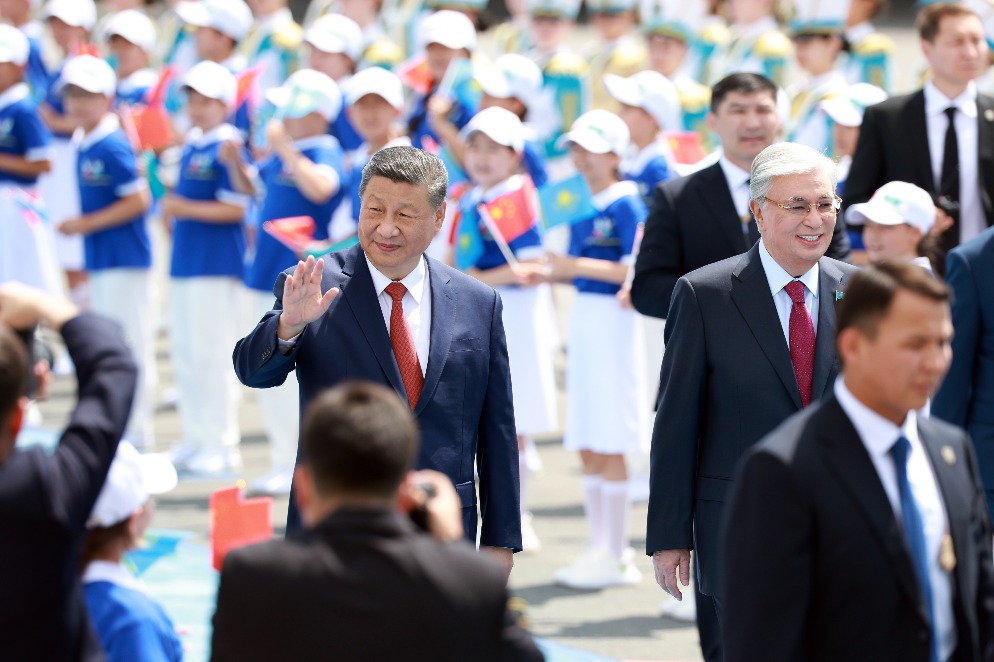Resourceful relationship

| Lu Shaye says China strives to build healthy partnerships with African countries on equal terms. Provided to China Daily |

Rich pickings abound for Chinese companies in African services sector, says top diplomat
Financial services companies, and particularly, private enterprises from China, can play a big role in African economic development, says Lu Shaye, director-general of the Department of African Affairs in the Foreign Ministry.
The 49-year-old Chinese diplomat, who is responsible for China's bilateral relations with African countries and regions, says the strong growth momentum in Africa can be gauged from its growing demand for financial and services-related investments.
"Even though Western companies hold sway in Africa's financial and service sectors, there is still enough room for Chinese companies to make their presence felt," Lu says.
Lu, who was earlier China's ambassador to Senegal, says that while it is important to put forward favorable policies for private enterprises in the African market, it is also equally important to gauge whether Chinese companies have the requisite bandwidth and the zeal to tap the African market.
Trade between China and Africa has diversified over the years and far surpassed the level when formal bilateral relations were established between the two sides. China-Africa trade volume has soared to nearly $200 billion, while Chinese investment in Africa has surpassed $17 billion.
To further strengthen political, economic and cultural relations between the two sides and jointly meet the challenges of economic globalization and promote common development, China and African countries launched the Forum on China-Africa Cooperation as a platform for collective dialogue and an effective mechanism for practical cooperation in the framework of South-South cooperation in 2000.
The implementation of the eight new measures and other follow-up actions of the Fourth Ministerial Conference of FOCAC, which was held in 2009, has seen successful conclusion. Among initiatives in the new measures are debt cancellations, tariff exemptions, concessional loans and special loans for small and medium-sized African enterprises.
Initiatives such as dispatching agrotechnology teams to Africa, construction of agrotechnology demonstration centers and China-Africa friendship schools, donations of medical equipment and anti-malaria supplies have also been implemented.
"China's aid to Africa has mostly been in the form of interest-free or low-interest loans. This is official debt that Africa owes to China. But due to several debt cancellations as part of the FOCAC, African countries now have little debt left owed to China," Lu says. "So in recent years, China has mainly been providing free aid to Africa."
With the world undergoing tremendous changes and China-Africa relations experiencing new development, at the opening ceremony of the Fifth Ministerial Conference of the FOCAC in 2012, Chinese President Hu Jintao declared that the government will take new measures in priority areas to support the course of peace and development in Africa.
The new measures focus on expanding cooperation in investment and financing to support sustainable development in Africa, increasing assistance to Africa, supporting the African integration process and helping Africa enhance its capacity for overall development, enhancing people-to-people friendship, and promoting peace and stability in Africa.
Chinese banks have managed to establish their presence in Africa. The China Development Bank, Export-Import Bank of China, Industrial and Commercial Bank of China, Bank of China and China Construction Bank have all made impressive strides.
China has also supported the African Development Bank and the West African Development Bank by injecting funds, canceling debts and establishing joint funds for a number of manufacturing and construction projects.
The implementation of a currency settlement agreement between China and some African countries will help promote more currency exchanges between the two sides, he says.
Lu says the two sides are also holding talks on implementing China-Africa monetary cooperation, which would be beneficial for improving trade relations and strengthening the functions of international financial organizations.
"Chinese investments in Africa have been diversifying due to the fast pace of urbanization and industrialization. The services sector seems to be well poised to attract more investments," he says.
According to IMF estimates, seven of the world's top 10 fastest growing economies, between 2011 and 2015, are in Africa.
Lu says that there could be more investment opportunities for Chinese companies in service industries such as tourism, aviation and financial services. More investment by Chinese companies will also help ease the trade deficit between China and Africa, he says.
"Business ties aside, Africa also has an amazing landscape that will attract Chinese tourists," Lu says. More than 100,000 Chinese tourists visited South Africa last year, while the number of tourists visiting the Seychelles rose to 4,000.
However, the present political situation in some sub-Saharan African countries is still a cause for concern for some Chinese companies. "Political unrest in Africa is hampering Chinese investments," he says.
According to Lu, the primary cause of political instability in Africa is the laggard economic development compounded by tribal conflicts and issues left over from colonial rule.
He applauds as "successful" the recent trip of Zhong Jianhua, special representative of the Chinese government on African affairs, to Burundi, the Democratic Republic of Congo and Rwanda, and adds that China will be more active in finding solutions to security issues.
Many Western countries are frustrated that China has built up a good image in Africa by constructing infrastructure projects and investing heavily in the mining sector, he says.
Lu says that China strives to build healthy partnerships with African nations on equal terms.
"Some Westerners say China's cooperation with African countries is a practice of 'neo-colonialism', while the African people say the West is re-colonizing Africa. Let's see what colonialism is - grabbing resources with violence, enslaving African people, seizing land and destroying African culture," he says.
"The truth is that China has helped African countries by building roads, bridges, hospitals and schools, and also purchases several African resources. China has never interfered in other countries' internal affairs, or imposed its culture and values, but instead focused more on providing financial and human assistance. We want African countries to solve their problems independently."
To help Chinese people have a better understanding of the continent, Lu's department set up a Weibo account, the equivalent of twitter and facebook in China, a year ago to provide information and interact with the public.
"China will play a more constructive role in helping build a peaceful and prosperous Africa, as the ties between the two sides have been integrated more than ever before," he says.
zhongnan@chinadaily.com.cn
(China Daily 03/08/2013 page24)
Today's Top News
- Cooperation between China, region becomes increasingly important
- Along ancient Silk Road, Xi cultivates stronger bonds with Central Asia
- Sino-Kazakh cooperation strengthened
- Sino-Uzbek agro-cooperation fruitful
- Retail sales surge points to strong resilience
- Intensified Mideast conflict spurs calls for de-escalation






























